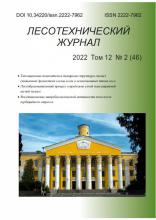Petrazavodsk, Russian Federation
One of the reasons that domestic machine-building enterprises have lost the market to foreign companies - manufacturers of machinery for harvesting and deep processing of woody biomass is underestimation of the need to accelerate the synthesis and implementation of domestic innovations in forest sector. The most important place in the number of such innovations is occupied by patented technological and technical solutions. The determining factor in formation of knowledge bases and convenience of further work with them is correct structuring and visualization of information that constitutes their essence. One of the approaches to the formation of knowledge bases is compilation of "intellectual matrices" for the development of an object of technology. These matrices are formed taking into account valuation of technical equipment reached by the object for the considered period of time of technical level by analyzing the patent documentation and helping to identify its most strongly and poorly developed "sides", which in turn makes it possible to determine promising areas for improvement. The authors offer the concept of knowledge management in forest complex by forming "intelligent matrices" for the synthesis of patentable technological and technical solutions. The concept was tested at a number of facilities of forest complex technologies and equipment and confirmed by forming and protecting of several dozens of patents. The methodology of synthesizing patentable technical solutions with the construction of intelligent matrices is shown on the example of constructive and technological analysis of a harvester. It is established that a promising direction for improving the design of harvester is to improve technical and economic characteristics of its operation in processor mode. The essence of patented technical solutions consists in equipping the handle of manipulator with an additional working element that allows to separate individual logs from the stack, thus providing free space next to them for free gripping of jaws of harvester head.
knowledge bases, innovations, intellectual matrices, forest complex, patents
1. Mil'ner B. Z. Koncepcija upravlenija znanijami v sovremennyh organizacijah [The concept of knowledge management in modern organizations]. Rossijskij zhurnal menedzhmenta, 2003, no 1, p. 57-76. (In Russian) EDN: https://elibrary.ru/HTYFHH
2. Dzhanetto K., Uiler Je. Upravlenie znanijami. Rukovodstvo po razrabotke i vnedreniju korporativnoj strate-gii upravlenija znanijami [Knowledge management. A guide to developing and implementing a corporate knowledge management strategy]. M, 2005, 192 p. (In Russian)
3. Danilova, E. V. Upravlenie znanijami kak faktor razvitija personala organizacii [Knowledge management as a factor in the development of the organization's personnel] : diss. … kand. jekon. nauk: 08.00.05: zashhishhena 17.12.2009 / E. V. Danilova. Moskva, 2009, 172 p. (In Russian) EDN: https://elibrary.ru/QEMNNV
4. Petrov, A. B. Upravlenie znanijami kak baza formirovanija innovacionno-obrazovatel'nyh organizacij [Knowledge management as the basis for the formation of innovation-educational organizations]. Problemy sovremennoj jekonomiki, 2011, no 3, p. 312-314. (In Russian) EDN: https://elibrary.ru/OJRVGH
5. Barney, J. V. Firm resources and sustainable competitive advantage. Journal of Management, 1991, Vol. 17, no 1, pp. 99-120. DOI: https://doi.org/10.1177/014920639101700108; EDN: https://elibrary.ru/YBVKYV
6. Bollinger A. S., Smith R.D. Managing organizational knowledge as a strategic asset. Journal of Knowledge Management, 2001, Vol. 5, no 1, pp. 8-18. EDN: https://elibrary.ru/EBNAMH
7. Davenport, T. Process innovation: reengineering work through information technology. Boston, 1993, 337 p.
8. Demarest M. Understanding knowledge management. Long Range Planning, 1997, Vol. 30, pp. 321-322, 374-384. EDN: https://elibrary.ru/AHLYST
9. Grant R.M. The knowledge-based view of the firm: implications for management practic. Long Range Planning, 1997, Vol. 30, pp. 450-454. EDN: https://elibrary.ru/AHLYWF
10. Drucker P.F. Knowledge Worker Productivity. California management review, 1999, Vol. 41, no 2, pp. 79-94. EDN: https://elibrary.ru/CZDQYT
11. Druker P. Upravlenie v obshhestve budushhego [Management in the society of the future]. Moskow, 2007, 320 p.
12. Nonaka I., Teece D. J. Managing industrial knowledge : creation, transfer and utilization. London, 2001, 344 p.
13. O'Leary, D. E. Enterprise knowledge management. IEEE Computer, 1998, no. 3, pp. 54-61.
14. Pfeffer J., Sutton R. J. "What" to do is not enogh: turning knowledge into action. Calif. manag. Review, 1999, Vol. 42, no 1, pp. 93-108.
15. Quinn J. B. Intelligent enterprise : a knowledge and service based paradigm for industry. New York, 1992, 473 p.
16. Senge P. M. The Fifth discipline field book : strategies and tools for building a learning organization. New York, 1994, 593 p.
17. Jarushina M. A. Formirovanie sistemy upravlenija znanijami v organizacii [Forming a knowledge manage-ment system in an organization]: diss. … kand. jekon. nauk: 08.00.05 zashhishhena 25.11.2003. Moskow, 2003, 174 p. EDN: https://elibrary.ru/NMLDTL
18. Kulopulos T., Frappaolo K. Upravlenie znanijami [Knowledge Management]. ZAO «Dokumentum Ser-visiz», 2001, 120 p.
19. Filatov V. V. Formirovanie jekonomiki znanij v global'noj innovacionnoj sfere na baze nauchno-issledovatel'skih setej [Formation of the knowledge economy in the global innovation sphere on the basis of research networks]. Vestnik Universiteta (Gosudarstvennyj universitet upravlenija), 2012, no. 9-1, pp. 208-219. EDN: https://elibrary.ru/PLFHEH
20. Gluhih I. N. Predstavlenie znanij i vyvod reshenij v situacionnyh bazah znanij [Representation of knowledge and conclusion of solutions in situational knowledge bases]. Vestnik Tjumenskogo gosudarstvennogo universiteta. Social'no-jekonomicheskie i pravovye issledovanija, 2006, no. 5, pp. 265-270.
21. Litvinskij K. O., Malyshev V. A., Nikitenko Ju. V. Priobretenie znanij v bazah znanij sistemy upravlenija tehnogennymi riskami na predprijatijah real'nogo sektora jekonomiki [Acquisition of knowledge in the knowledge ba-ses of the management system of technogenic risks at enterprises of the real sector of the economy]. Jekonomika: teorija i praktika, 2015, no. 4 (40), pp. 25-31.
22. Ivanisenko V. A., Podkolodnyj N. L., Demenkov P. S., Ivanisenko T. V., Podkolodnaja O. A., Ignat'eva E. V., Hlebodarova T. M., Podkolodnaja N. N., Anan'ko E. A., Goncharov S. S., Kolchanov N. N. Izvlechenie znanij iz tekstov nauchnyh publikacij i sozdanie baz znanij v oblasti nanobiotehnologii [Extracting knowledge from the texts of scientific publications and creating knowledge bases in the field of nanobiotechnology]. Rossijskie nanotehnologii, 2011, Vol. 6, no. 7-8, pp. 14-21. EDN: https://elibrary.ru/NXRGYB
23. Putilov A.A., Badalov A. Ju., Baranov A. V., Vorob'ev A. G., Putilov A. V. Podhody k formirovaniju sistemy upravlenija znanijami v jekonomike syr'evoj bazy atomnoj otrasli [Approaches to the formation of a knowledge man-agement system in the economy of the raw materials base of the nuclear industry]. Cvetnye metally, 2010, no. 8, pp. 9-15. EDN: https://elibrary.ru/MUHERT
24. Tochilov L.S. Proekt bazy znanij dlja razrabotchikov raketno-kosmicheskoj tehniki [The project of knowledge base for developers of rocket and space technology]. Inzhenernyj zhurnal: nauka i innovacii, 2016, no. 8 (56), pp. 4. DOI: https://doi.org/10.18698/2308-6033-2016-8-1527; EDN: https://elibrary.ru/XBEJGV
25. Karpov A. V., Denikin A. S., Alekseev A. P., Zagrebaev V. I., Rachkov V. A., Naumenko M. A., Sajko V. V. Setevaja baza znanij NRV po jadernoj fizike nizkih jenergij [NRV network knowledge base for low-energy nuclear physics]. Jadernaja fizika, 2016, Vol.. 79, no. 5, 520 p. DOI: https://doi.org/10.7868/S0044002716040152; EDN: https://elibrary.ru/WLNOJP
26. Komarova N. V. Optimizacija organizacionnyh reshenij s ispol'zovaniem normativnoj bazy i metodov upravlenija znanijami na rossijskih aviastroitel'nyh predprijatijah [Optimization of organizational decisions using the regulatory framework and knowledge management methods at Russian aircraft manufacturing enterprises]. Evrazijskij sojuz uchenyh, 2015, no. 6-2 (15), pp. 102-14. EDN: https://elibrary.ru/WXFOPZ
27. Abramenko G. V., Vasil'kov D. V., Voron'ko O. V. Prakticheskij metod sozdanija baz znanij [Practical method of creating knowledge bases]. Konversija v mashinostroenii, 2006, no. 5, pp. 45-50. EDN: https://elibrary.ru/HVLUUZ
28. Lim V. G., Suhoverhov Ju. N, Grachev V. A. Metody organizacii bazy znanij v sistemah avtomatizirovannogo proektirovanija [Methods for organizing the knowledge base in CAD systems]. Oboronnyj kompleks - nauchno-tehnicheskomu progressu Rossii, 2006, no. 4, pp. 41-46. EDN: https://elibrary.ru/KASDGH
29. Tjagunov M. G., Galka V. V., Gavrilova. O. V. Modeli i bazy znanij ob obektah i processah gidrojenergetiki [Models and knowledge bases on hydropower facilities and processes]. Gidrotehnicheskoe stroitel'stvo, 2015, no. 7, pp. 51-55. EDN: https://elibrary.ru/UMYJDB
30. Dolgova E. V., Rahmanov A. A., Kurushin D. S., Fajzrahmanov R. A. Sozdanie bazy znanij i komponenta prinjatija reshenij mobil'nogo robota na osnove aktivnoj semanticheskoj seti [Creation of knowledge base and compo-nent of mobile robot decision making on the basis of active semantic network] Nauchnoe obozrenie, 2015, no. 15, pp. 251-256. EDN: https://elibrary.ru/UXSHWJ
31. Gorbatova E. A., Emel'janenko E. A., Zareckij M. V. Baza znanij avtomatizirovannoj sistemy tehnologicheskoj podgotovki proizvodstva dlja pererabotki rudnogo syr'ja [The knowledge base of the automated sys-tem of technological preparation of production for the processing of ore raw materials]. Avtomatizirovannye tehnologii i proizvodstva, 2016, no. 4 (14), pp. 70-74. EDN: https://elibrary.ru/XQRNKF
32. Kovalenko A. I., Petrash V. Ja. Formirovanie proektnyh reshenij bespilotnyh letatel'nyh apparatov v programmno-informacionnoj srede bazy znanij [Formation of design solutions for unmanned aerial vehicles in the software and information environment of the knowledge base]. Vestnik Moskovskogo aviacionnogo institute, 2012, Vol. 19, no. 4, pp. 65-72. EDN: https://elibrary.ru/PCQNBH
33. Gajnceva E. S., Gorjuhin A. S. Formirovanie bazy znanij pri razrabotke jekspertnoj sistemy dlja poluchenija lopatok turbin [Formation of the knowledge base when developing an expert system for producing turbine blades]. Polzunovskij al'manah, 2011, no. 4, pp. 191-194. EDN: https://elibrary.ru/PAFGSZ
34. Arbuzov Ju. A., Himich V. N. Funkcionirovanie bazy znanij v sistemah upravlenija proizvodstvom remontno-vosstanovitel'nyh rabot [The functioning of the knowledge base in production management systems for repair and resto-ration works]. Remont. Vosstanovlenie. Modernizacija, 2011, no. 11, pp. 49-51. EDN: https://elibrary.ru/ONHVVN
35. Dzengelevskij A.E., Nizametdinov Sh. U., Rumjancev V. P. Baza znanij po avtomatizacii predprijatij [Knowledge base for enterprise automation]. Estestvennye i tehnicheskie nauki, 2011, no. 6 (56), pp. 530-532. EDN: https://elibrary.ru/OPCAPD
36. Vasil'ev A. S. O formirovanii bazy znanij dlja postroenija «intellektual'nyh matric» v oblasti lesovoznogo transporta lesa [On the formation of a knowledge base for the construction of "intelligent matrices" in the field of tim-ber transport of forests]. Obrazovanie i nauka v sovremennyh uslovijah, 2016, no. 2-2 (7), pp. 59-60. EDN: https://elibrary.ru/WAFJAN
37. Meleshko A. V., Loginova G. A. Sozdanie bazy znanij tehnologicheskih harakteristik oborudovanija dlja otdelki izdelij iz drevesiny [Creation of a knowledge base for the technological characteristics of equipment for finishing wood products]. Dizajn i proizvodstvo mebeli, 2006, no. 2, pp. 29-35. EDN: https://elibrary.ru/HVYXOP
38. Doljatovskij V.A., Ivahnenko A. V., Zhiroden Zh. P., Doljatovskij L. V. Razrabotka bazy znanij dlja adaptivnogo upravlenija firmoj na rynkah [Development of a knowledge base for adaptive management of a firm in markets]. Sistemnyj analiz v proektirovanii i upravlenii. materialy XIX Mezhdunarodnoj nauchno-prakticheskoj konferencii, 2015, pp. 363-368. EDN: https://elibrary.ru/UTBSSN
39. Nikiforova N. Ju., Chernjahovskaja M. Ju. Baza znanij zabolevanija «ostryj appendicit» -sostavljajushhaja informacionnogo napolnenija banka medicinskih znanij [The knowledge base of the disease "acute appendicitis" is a component of the information content of the bank of medical knowledge]. Informatika i sistemy upravlenija, 2008, no. 3 (17), pp. 8. EDN: https://elibrary.ru/JTRNCT
40. Hodakovskij Je.M. Geoinformacionnaja sistema kak baza znanij dlja prinjatija upravlencheskih reshenij [Geoinformation system as a knowledge base for making managerial decisions]. Metody menedzhmenta kachestva, 2016, no. 8, pp. 36-39. EDN: https://elibrary.ru/WHFZWD
41. Vasilev A. S., Shegelman I. R., Aminov V. N., Kameneva E. E., Shchukin P. O. Philosophy of technical equipment improvement as exemplified by a jaw crusher. Indian Journal of Science & Technology, 2016, Vol. 9, Issue 46, pp. 252-252.
42. Shegel'man I. R. Funkcional'no-tehnologicheskij analiz: metod formirovanija innovacionnyh tehnicheskih reshenij dlja lesnoj promyshlennosti [Functional-technological analysis: the method of forming innovative technical solutions for the forest industry]: monografija. Petrozavodsk, 2012, 96 p. EDN: https://elibrary.ru/QLCVBD
43. Shegel'man I. R., Vasil'ev A. S., Budnik P. V. Metodologija sinteza patentosposobnyh obektov intellektual'noj sobstvenno-sti [Methodology of synthesis of patentable objects of intellectual property] : monografija. Petrozavodsk, 2015, 131 p. EDN: https://elibrary.ru/SDXTJA












